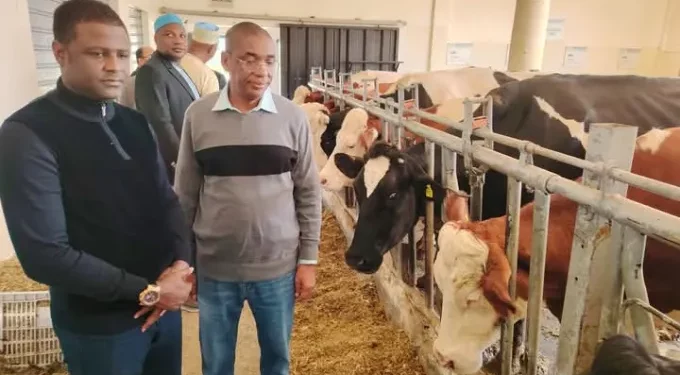In preparation for the launch of the newly established Yobe State Ministry of Livestock Development, a delegation from Yobe travelled to Morocco on Tuesday to engage with Maroc Lait, the country’s largest livestock farm, for the transfer of technology, experience, and knowledge aimed at enhancing successful livestock development in the state.
Mohammed Raita, the director general of the company, hailed the establishment of an independent Ministry of Livestock by both the federal and state governments as a positive step towards improving livestock development and revenue generation.
He advised the state government to focus on developing effective management practices, genetics, feed, water supply, and veterinary services to ensure the success of livestock farming in Yobe and Nigeria as a whole.
Raita stated, “We have developed a fodder laboratory for the production of fodder seeds, which will provide healthy and nutritious feed for cattle, thereby increasing dairy and beef production for livestock farmers.”
He explained that Morocco produces over two billion litres of healthy dairy each year, contributing significantly to the nation’s revenue.
“You should consider introducing artificial insemination to crossbreed with local varieties to enhance your livestock’s genetic quality, thereby boosting beef and dairy production in the state,” the Director General advised.
He assured the delegation that the company would offer cost-effective services to individual livestock farmers, cooperative organisations, and the state government.
The leader of the delegation and Secretary to the Yobe State Government, Baba Malam Wali, explained that the state government is committed to harnessing existing potential to enhance livestock development.
“As a leading state in livestock production, Yobe State is eager to explore every available opportunity to support existing livestock farmers and create new ones,” he stated.
The Commissioner for Agriculture and Livestock Development, Mustapha Goniri, affirmed the government’s commitment to investing in livestock development to create employment and generate wealth.
“We aim to increase dairy production from the current three litres per day produced by local breeds to at least 30 litres daily per cow using improved breeds and enhancing the capacity of existing livestock,” he said.
“It is encouraging that the state government has already implemented measures, including grazing reserves, water points, and veterinary services for livestock farmers across the state.
“The ministry will provide all the necessary resources to improve livestock development and empower farmers in the state,” Goniri concluded.



